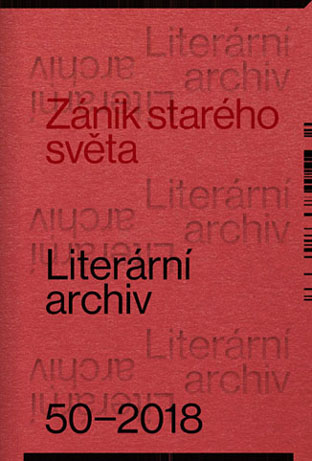„Ve stínu třetího listopadu“
“In the Shadow of the 3rd of November”
The Image of the End of the War and of the Dissolution of the Habsburg Monarchy in Moravian German Literature
Author(s): Milan HorňáčekSubject(s): Czech Literature, German Literature, Pre-WW I & WW I (1900 -1919)
Published by: Památník národního písemnictví
Keywords: the image of the First World War in literature;Moravian German literature;Erwin Ott;Robert Mimra;the narrative of the Ideas of 1914;the dissolution of the Habsburg monarchy;war novel;
Summary/Abstract: The paper focuses on the image of the end of the First World War and the dissolution of the Habsburg monarchy in three (post)war Moravian-German novels (Erwin Ott: Das Ende. Ein Roman vom Zusammenbruch der Südfront 1918[The End. A Novel about the Collapse of the Southern Front 1918, 1930]; Robert Mimra: Batterie 4 [Battery 4, 1930]; Robert Mimra: Im Schatten des 3. November [In the Shadow of the 3rd of November, 1933]). The main purpose is to show how these novels stage the end of the war from the perspective of the emerging collective identity of the German-speaking population in Moravia and, in line with that, attempt to imbue the war with a “meaning” in spite of the defeat of the Central Powers. Crucial in this respect were the so-called “Ideas of 1914”, i.e., the belief that the war will lead to a fundamental “rebirth” of society and to the emergence of a homogenous “community” in the sense of the German sociologist Ferdinand Tönnies. The paper wants to demonstrate that the above mentioned novels do radically transform, or radicalize, the 1914 Ideas and their accompanying narrative: the First World War is seen as a process leading to the recognition of one’s “Germanness”, for which there was no room within the multinational Habsburg monarchy. The end of the war and the downfall of the monarchy thus acquire the character of a mere intermezzo, after which a new conflict must ensue that will secure the birth of the desired national “community”, but also the integration of Austrian Germans into the German empire. A special role is ascribed by these analyzed novels to the front-line soldiers as the new elite emerging from the battles of the First World War.
Journal: Literární archiv
- Issue Year: 2018
- Issue No: 50
- Page Range: 84-102
- Page Count: 19
- Language: Czech

